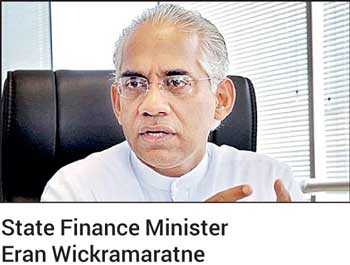Monday Feb 23, 2026
Monday Feb 23, 2026
Saturday, 24 August 2019 00:10 - - {{hitsCtrl.values.hits}}
 By Ashwin Hemmathagama – Our Lobby Correspondent
By Ashwin Hemmathagama – Our Lobby Correspondent
Investor confidence in the Colombo Stock Exchange (CSE) deteriorated during the previous Government, which used funds of the Employees’ Provident Fund (EPF) and the Employees’ Trust Fund (ETF) for shady transactions that shocked investors, State Minister of Finance Eran Wickremeratne held in Parliament yesterday.
The State Minister, responding to a supplementary question raised by United People’s Freedom Alliance (UPFA) lawmaker Bandula Gunawardena, said: “The former President, who was the Minister of Finance, and the former Governor of the Central Bank of Sri Lanka are responsible for weakening trust in the stock market. There is a complaint on the loss of Rs. 12 billion of EPF money during that era. Capital losses incurred in Ceylon Grain Elevators, Piramal Glass, Galadari Hotel, and Laugfs Gas are widely known. Those days, Laugfs Gas was listed in the secondary board – Dirisaviya at the CSE.”
According to Wickremeratne, long-term plans should be laid in order to see upward price movements in stock markets.
Using Budget proposal 294 and 295 presented in Parliament in 2016, the Government adopted measures to encourage foreign companies for dollar listings in the Colombo Stock Exchange. The multi-currency board, launched in March, is another measure to attract foreign companies in order to increase the liquidity of CSE.
“The multi-currency board was established for the first time in Sri Lanka, eyeing the companies in the Maldives. The companies expecting to get listed here in the multi-currency board should first obtain a listing in their own countries. Such a measure will help to certify good companies which will be allowed to list here in the CSE. Listings of this nature will enable trading of foreign currency-denominated stocks at CSE and increase liquidity,” held the State Minister, who said the market capitalisation that stood at Rs. 2.39 trillion in 2015 had increased to Rs. 2.89 trillion by the end of 2018.
Explaining the benefits given to investors under United National Party (UNP) governments in the past, the State Minister held Prime Minister Ranil Wickremesinghe, who was the Minister of Industries in 1990, took a bold step to exempt the stock market gains from the capital gains tax. “This has been reconfirmed in the Inland Revenue Act no.24 of 2017,” he added.
Explaining the reasons for not pegging the exchange rate, the State Minister said the Government has allowed market forces to determine the value of the rupee against other currencies. “There are two ways to decide the value of the rupee. We can either maintain the value of the currency at a fixed rate or let the market decide the exchange rate. With free-float of the exchange rate, the Government expects to boost the exports that fell from the 30% range to 15% of the GDP in the past. It is imprudent to debate about the value of the exchange but we should focus on the policy followed to boost exports,” he added.